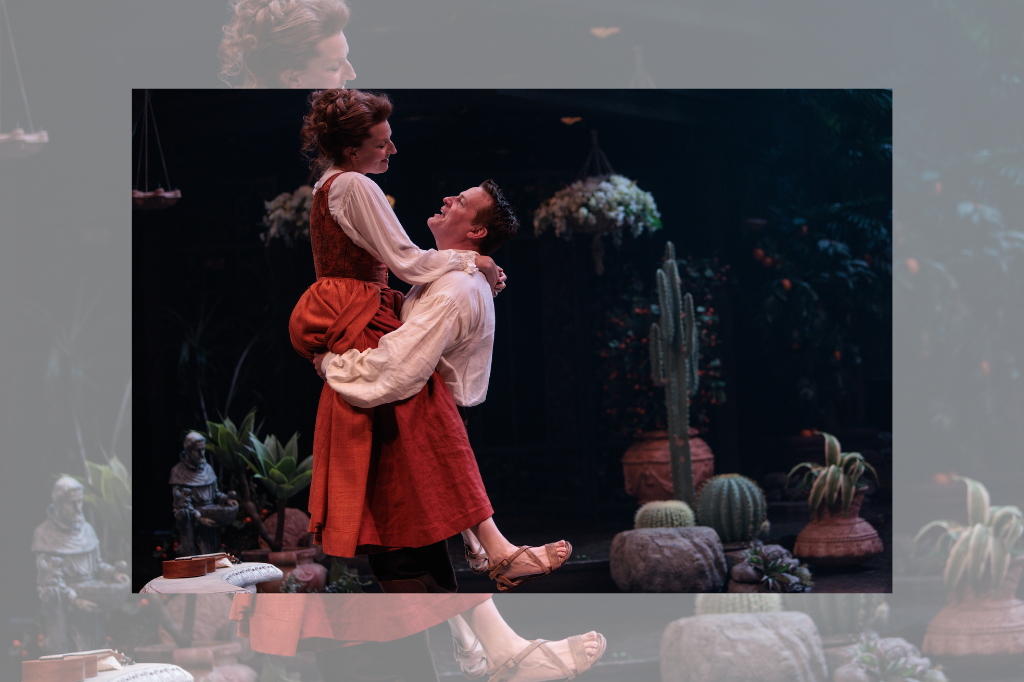REVIEW: Much Ado About Nothing at the Stratford Festival
A giant glowing ring, suspended from a massive tree, presides over the set (designed by Julie Fox) of director Chris Abraham’s uproarious Much Ado About Nothing at the Stratford Festival. Sometimes spinning, sometimes still, it’s not the One Ring that Frodo must consign to the fires of Mount Doom, but a representation of the contract of marriage and premarital demand of chastity, themes which also constantly dangle over the proceedings.
The ring also denotes a big fat zero, as in the trifle that sparks a nearly life-ending predicament, or the happy nothing that results from its villain’s scheming. And, of course, in Shakespearean English, “nothing” (pronounced more like “noting”) is slang for a woman’s private parts, around which much of the play’s gossip is concerned.
In this updated Ado, the hoop also made me think of the proverbial “brass ring” we all reach for to achieve success — because Stratford’s production is a winner.
Shakespeare’s gloriously grouchy and reluctant lovers, Beatrice (Maev Beaty) and Benedick (Graham Abbey) have formed the template for many a successful romantic comedy. He swears he’ll never get married; she’s been burned before, and wants to preserve her personhood. Their bitchy brouhahas both entertain and exasperate their families and friends, who decide to fake them out into catching and declaring feelings for each other.
Meanwhile Benedick’s current BFF, Claudio (Austin Eckert), finds himself desperately in love with Beatrice’s dear cousin Hero (Allison Edwards-Crewe), and hopes squad leader Don Pedro (a commanding André Sills) will make the match. Don Pedro’s sniveling bastard brother Don John (Michael Blake) wishes to depose his brother in any way possible, and fakes out the fake-outers, convincing Don Pedro, Claudio, and even Hero’s father Leonato (Patrick McManus) that she is unfaithful, an accusation that will essentially remove her value as a mate, narrowing her life to — that’s right — nothing. It’s now up to Beatrice and Benedick to stop squabbling and preserve Hero’s honour.
The word honour is key here, yet another thing about which there’s much ado. The show pokes fun at the façade-like nature of honour, easily punctured and riding on appearance, rather than deed. One of the most significant unique aspects to the production is Erin Shields’ added text at the beginning and near the end of the play, both of which give the women more agency. In a new opening monologue, that dangling ring also represents the mirror into which Hero stares, as Beatrice contemplates the nature of a woman’s situation in a patriarchal world, along with our inability to really know the lives of others or even fully understand ourselves.
Shields later deals with the lingering question of whether Hero really should forgive Claudio, given his ability to go from a dopey-eyed placer of women on pedestals to pedestal-pusher and incel at a moment’s notice? Shields gives Hero a beautiful speech which explains her rationale and breaks the character’s silence, and Edwards-Crewe brings true depth and passion to it, elevating the character from simply a wronged, chaste bride. While you’ll likely notice the more modern ideals of the additions, Shields does an admirable job of capturing Shakespeare’s cadence so that they flow into the rest of the play.
The play may have received a feminist upgrade, but that doesn’t mean it’s didactic. Indeed, this production is joyful and high-energy, with plenty of music courtesy of Thomas Ryder Payne (the onstage band is an effective presence throughout, often following and highlighting the action) and physical comedy. Highlights of the latter include Beatrice and Benedick’s attempts to stay stealthy behind gossipers who are plainly aware of their presence. Whether it’s Abbey falling out of the foliage or Beaty carrying a table on her back like an Atlas who’s also in charge of the buffet, the pratfalls are performed with ease for huge laughs. The production also makes great use of the aisles of the large Festival Theatre, blooming out to involve entrances and exits, including an impressive tumble from Jakob Ehman’s swaggering Borachio.
Much Ado’s success rides or dies on its leads, and both Abbey and Beaty have the chops to make their flawed couple likeable, including appealing chemistry, a sense of ebullience in the language they use so cleverly, and a care for the people around them that causes their jabs to land truly but more softly. Beaty in particular brings a fire to her character, especially in her devotion to her cousin, that makes it hard not to be #TeamBeatrice all evening.
One might, though, hope to feel more of the vulnerability and desire to be loved that fully fleshes out the characters, particularly Benedick. For example, the choice to frame his initial joy at believing Beatrice is hopelessly in love with him as over-the-top male posturing is very, very funny, as is her reaction. However, in focusing on a more stereotypical type of humour, it’s missing a layer of almost childlike giddiness and wonder at the thought of being seen and loved for who you really are. Without this choice, though, we would lose a chance to see the reactions of Hero’s attendants Margaret and Ursula (Déjah Dixon-Green and Akosua Amo-Adem), who take every opportunity to deflate Benedick’s ego with glee.
Where Abbey really shines is in his interaction with the audience, involving unsuspecting patrons in prop business and dropping the occasional delightful metatheatrical comment. These fourth-wall-breaking references are not only entertaining, but serve to remind us that while tension is high, the stakes are low.
Beaty and Abbey aren’t the only two to watch. Sills as Don Pedro projects warmth, authority, and a sense of melancholy that gives him a touch of Cyrano de Bergerac as he brokers matches between his subjects without one himself. Eckert’s Claudio is a young pup with sad eyes, making his heel turn towards Hero all the more reprehensible, and Josue Laboucane, Glynis Ranney, Dante Prince, Kevin Kruchkywich and John Kirkpatrick get right down to milking every laugh out of their props, costumes, and gratuitous bird calls as the rude mechanicals that are the incredibly incompetent Dogberry and the Neighbourhood Watch. Even the smaller parts have notable business, such as the limping Antonio (Anthony Santiago) backing up his more vocally incensed brother Leonato in his threats to Claudio by dropping his cane to get into fighting stance with what strength he has left, changing a wedding ring to a boxing ring.
Abraham’s production, in its unapologetic new content and its fighting spirit, is a ringing success. Shakespeare purists might make much ado about the changes. But they can watch one of the thousands of other productions of this play. This one adds up to a lot more than nothing.
Much Ado About Nothing runs at the Stratford Festival until October 27. Tickets are available here.
Intermission reviews are independent and unrelated to Intermission’s partnered content. Learn more about Intermission’s partnership model here.












Comments